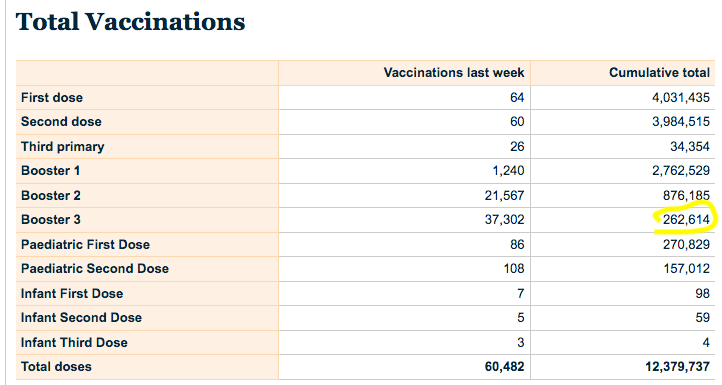How many people have gotten the bivalent booster in NZ?
Bivalent booster numbers to May 5th & pregnancy recommendations for the bivalent vaccine
In October 2022, the priorities of the Covid-19 vaccine program from the Strategic Covid-19 Public Health Advisory Group were sent to then Covid-19 Minister Ayesha Verrall.
This group were the architects of New Zealand’s elimination strategy, as well as advising on how and when borders re-opened, including that the elimination strategy should even then be pursued indefinitely. They were also referred to as the Skegg group when Sir David Skegg was chair, replaced by Professor Nikki Turner in August 2022.
Their October letter advocated for the priority and efforts of the Covid vaccine program, to now be focused on ”…reducing inequity…by increasing vaccination rates in groups where the gains would be greatest across those at highest risk.”
This meant in the groups where there is “…excess risk of mortality for older ages, Māori and Pacific peoples, those from lower socio-economic backgrounds, and those with co-morbidities.”
The biggest difference in vaccine coverage was between dose 2 and 3 and if you are 1 of the 88,000 people, including 5,500 Pacific people and 13,000 Māori, between 54 and 65 who have not had dose 3 - I think it means they are coming for you.
But on the flip side, if you are unvaccinated - they’ve now given up on you, “There is expected to be lesser gain for a focus on fully unvaccinated as this group is less likely to accept vaccination.”
It ended by saying although these dose differences exist in the under 54s too, “Younger populations are significantly less at risk.”
Finally they admit it.
3rd bivalent booster numbers
I wrote a few weeks ago about the bivalent booster and counted the doses that the Ministry of Health has recommended so far in New Zealand. Data wasn’t available at the time on doses administered.
But the Ministry of Health vaccinations data page is now listing booster 3 doses given to midnight Friday the 5th of May as: 262,614.
A recent press release announcing expanding access of the bivalent booster to pregnant people over 16, confusingly also said from the 1st of March 2023, when the bivalent became available, 317,099 people have received an “additional” booster.
I got a bit confused about the difference in numbers so I asked.
Rob Humphrys, Te Whatu Ora – Health New Zealand National Immunisation Programme Group Manager said “…the figure of 317,099 was for all booster doses administered between 1 April 2023 and 28 April 2023, not just booster 3.”
And since the 1st of March “…to 11.59pm on 28 April 330,041 people have received the bivalent Covid-19 vaccine.” Okay, so 330k people have had a dose of bivalent, whatever the dose number may be - I wonder how many of those extra doses includes the previously mentioned 2nd booster and what efforts they went to get people to take it.
The winter surge package rapid review by Allen + Clarke noted that the rollout of the 2nd booster in 2022, “…was more difficult than anticipated because the high level of apathy towards the vaccine had not been predicted.”
Roughly 47% of the total eligible population for the 2nd booster took it.
At the end of March 1.4 million doses of the monovalent version of the vaccine were destroyed - what level of apathy is being predicted for this 3rd booster? Are the numbers aligning to their expectations? Or are we paying for something no one wants, that will also end up in the trash?
And by the way, like the Covid vaccination drive, yes if you get a flu shot or Covid bivalent booster - there just might be DJs and an ice-cream cart.
Pregnancy & the bivalent booster
The press release I mentioned above, expanding access to pregnant people over 16, seemed odd at first as the criteria to get the bivalent is largely restricted to people aged over 30 years old. The rationale for this in the press release was “…more pregnant people can receive both a COVID-19 vaccine and funded flu vaccine at the same time.”
Free flu vaccines are recommended for pregnancy, and the standard recommendation when the Covid vaccine arrived was you could get both vaccinations at the same time. Which brings the bivalent booster in line with flu vaccination advice from Pharmac. This announcement wasn’t explicitly accompanied by any further data on safety or efficacy - which was problematic it turns out for the initial Pfizer rollout.
Looking back (hey this is a history Substack!) on the 3rd of August in 2021, the Covid-19 Vaccination Technical Advisory Group (CV-TAG) briefly talked about co-administration of vaccines as a way to support service delivery.
By July 2022 discussions were underway about integrating the Covid-19 vaccines with the wider National Immunisation Programme as influenza season approached. The winter surge package expanded access to both 2nd boosters and flu vaccinations. In a August meeting they noted the rates of Covid doses are “…becoming a growing concern as ‘COVID-19 fatigue’ sets in.”
Their September 2022 meeting again reiterates the reason as service delivery:
Getting both a flu and bivalent booster in the same appointment is clearly seen as convenient, and may be more likely to get doses in arms - but is there more data available or was the expansion to align the bivalent booster to flu shots for pregnancy advice simply an admin decision?






Have you seen Pfizer trial C4591030? Ran from April to Sept 2022 in NZ studying safety of coadministration of 4th Covid shot with flu vaccine. https://clinicaltrials.gov/ct2/results?cond=&term=c4591030&cntry=&state=&city=&dist=